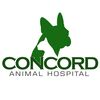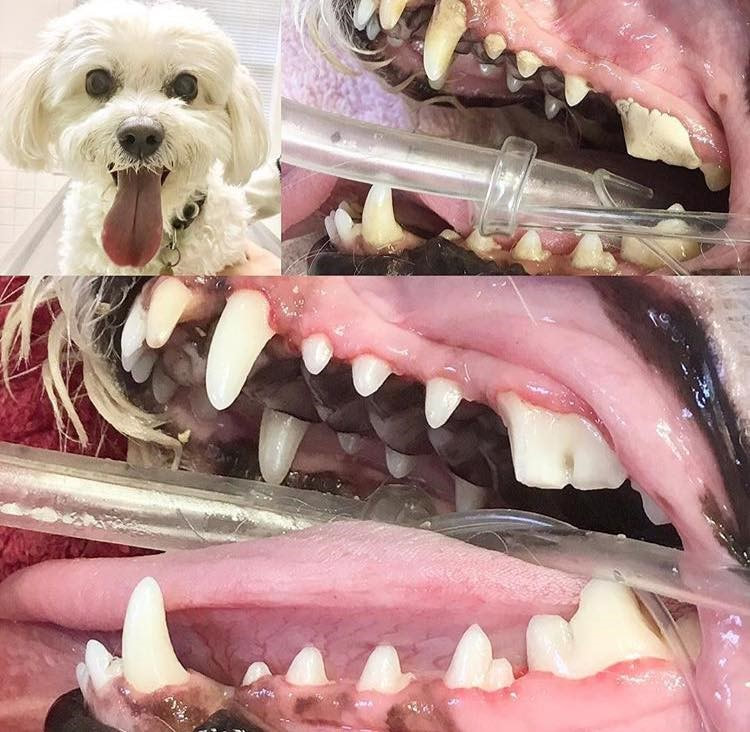Dental Health
|
A core piece of your pet’s healthcare is dental health. Bad breath can be a sign of dental disease, a disease identified in over 70% of cats and 80% of dogs over age three. Pets can get plaque, tartar, gingivitis and other periodontal diseases just like humans. Left untreated, dental disease can be painful and can lead to more serious health problems such as heart, lung and kidney disease. Fortunately, all our veterinarians are also trained to attend to your pet’s oral care! Our goal is to keep your pet’s mouth and whole body healthy and to prevent pain, infection and tooth loss.
WHAT DOES DENTAL DISEASE LOOK LIKE IN PETS? Plaque is a soft and sticky film containing bacteria that builds up on your pet’s teeth, particularly around the gumline. It can cause tooth decay and gum disease and impact other organs such as the heart and kidneys if not removed with regular brushing and hardens to become tartar after two or three days. WHAT ARE THE SIGNS OF DENTAL DISEASE I SHOULD LOOK FOR? Bad breath is a symptom of periodontal disease, but it isn’t the only one. If your pet is suffering from dental disease, you might see one or more of the following symptoms. If you do, please contact our office immediately for a dental exam. These symptoms indicate that your pet is uncomfortable at best, but they could be in severe pain.
WHAT DOES DENTAL CARE LOOK LIKE AT CAH?
Part of your pet’s regular physical exam will always include an examination of your pet’s mouth. We will discuss an oral program suited to your pet’s needs such as tooth-cleaning food & treats, tooth brushing, water additives and, if needed, a dental cleaning and possibly removal of diseased or decayed teeth. Pets with dental disease are often in pain and won’t let us get a very good look at their mouth. You veterinarian will be able to tell whether or not a cleaning is needed but may not know the extent of the dental disease until the pet is under general anesthesia for their dental cleaning. |
Here's what you can do at home!
|
|
|
WHAT DOES A DENTAL CLEANING ENTAIL?
If a dental procedure is recommended, your pet's procedure will include a thorough oral examination, full-mouth x-rays, periodontal charting, ultrasonic scaling and polishing and, when necessary (and only when necessary), removal of diseased teeth. Your pet will be under general anesthesia during the procedure – no dog or cat would be able to sit still for a dental procedure! Dental procedures are performed by one of our veterinarians and assisted by a trained surgical technician. This team will monitor your pet before, during and after your pet’s procedure. Your pet’s blood pressure, heart rate, respiration, oxygenation and core body temperature are monitored while under anesthesia and we try to minimize pain with medications and localized anesthesia. |
Unless otherwise indicated, your pet will be discharged on the same day. One of our technicians or veterinarians will review post-procedure care with you, which will likely include medications to manage discomfort or pain.
In advance of your pet’s dental procedure, we will perform pre-anesthetic blood work. This is to ensure that any pet going under anesthesia has properly functioning kidneys and liver, since these are the organs that metabolize anesthesia. We also check blood for diabetes, hypoglycemia, anemia or infection to make sure your pet is healthy enough to undergo their surgical procedure.
The evening before your pet’s procedure, don’t feed them after 6 pm or give them any liquids after midnight unless otherwise indicated by your veterinarian.
WHAT IF TEETH NEED TO BE REMOVED?
Your veterinarian may not know whether there are teeth that should be extracted until your pet is under general anesthesia. Dogs and cats with sore mouths may not let anyone get close enough to get a good look at their teeth.
We will call you during the dental procedure to discuss our findings and before we remove any teeth to make sure you are aligned with our plan. Please be assured that our goal is to keep healthy teeth as much as possible! We will only recommend removing teeth that are or are likely to be problematic for your pet.
In advance of your pet’s dental procedure, we will perform pre-anesthetic blood work. This is to ensure that any pet going under anesthesia has properly functioning kidneys and liver, since these are the organs that metabolize anesthesia. We also check blood for diabetes, hypoglycemia, anemia or infection to make sure your pet is healthy enough to undergo their surgical procedure.
The evening before your pet’s procedure, don’t feed them after 6 pm or give them any liquids after midnight unless otherwise indicated by your veterinarian.
WHAT IF TEETH NEED TO BE REMOVED?
Your veterinarian may not know whether there are teeth that should be extracted until your pet is under general anesthesia. Dogs and cats with sore mouths may not let anyone get close enough to get a good look at their teeth.
We will call you during the dental procedure to discuss our findings and before we remove any teeth to make sure you are aligned with our plan. Please be assured that our goal is to keep healthy teeth as much as possible! We will only recommend removing teeth that are or are likely to be problematic for your pet.

